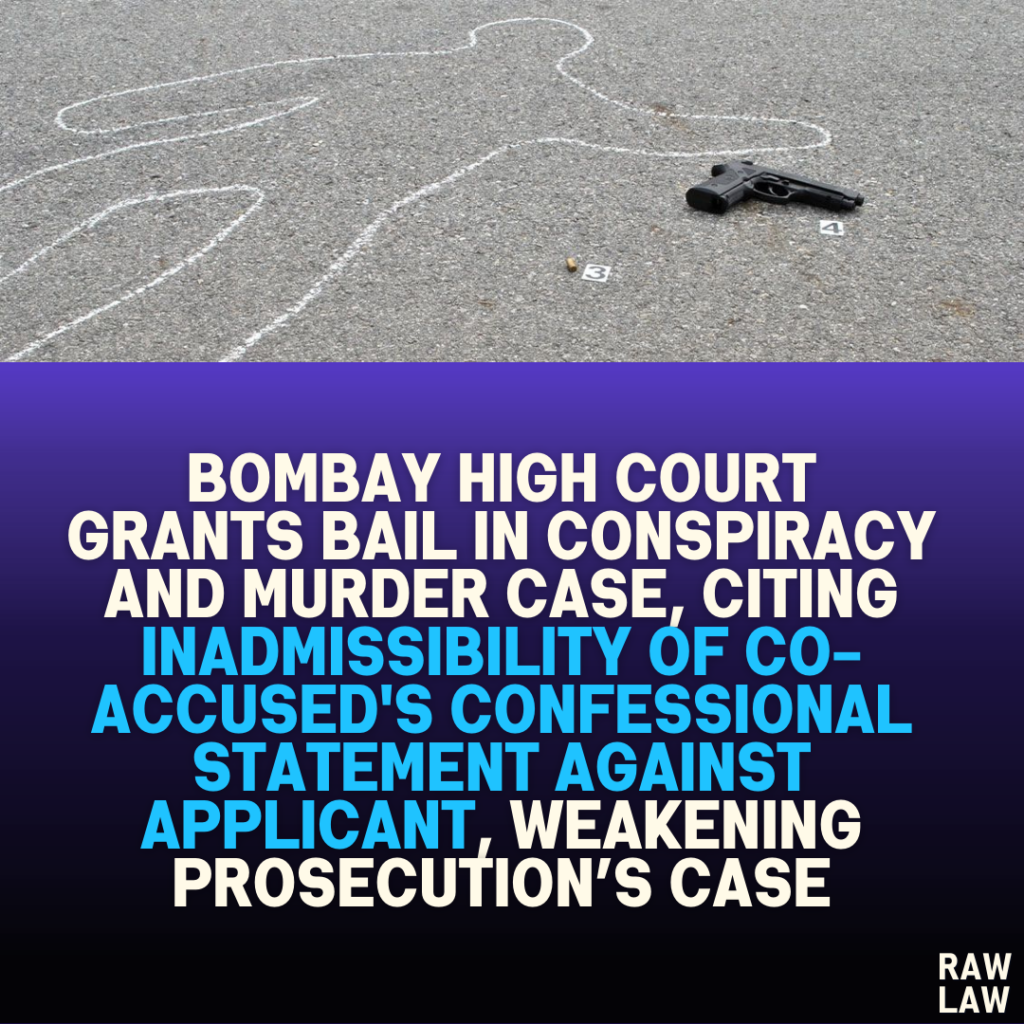Court’s Decision: The Bombay High Court granted bail to the applicant, who had been in custody since January 20, 2020, in connection with a conspiracy and murder case. The court emphasized that the trial, involving over 70 witnesses, was progressing at a slow pace, with no immediate conclusion in sight. Although the prosecution presented individual pieces of circumstantial evidence against the applicant, the court found that these alone did not justify continued detention, especially given the prolonged custody and slow trial process. The applicant was released on a bail bond of Rs. 50,000, with conditions to ensure cooperation with the trial proceedings.
Facts: The case pertains to the murders of two individuals, Ajay and Dhirendra, on April 1, 2018. The prosecution alleged that the applicant, along with other co-accused, conspired to murder the victims, motivated by financial disputes involving the main accused, Suresh Patel. The applicant was alleged to have facilitated the payment of money to the families of the arrested conspirators and participated in meetings related to the conspiracy. After over four years of custody, the applicant sought bail, citing the slow progress of the trial and the circumstantial nature of the evidence against him.
Issues:
- Whether the prolonged detention of the applicant without the trial concluding justified the grant of bail.
- Whether the circumstantial evidence presented by the prosecution was sufficient to deny bail to the applicant.
Petitioner’s Arguments: The applicant argued that he had been in custody for more than four years, and the trial was unlikely to conclude soon. He also contended that the evidence against him was largely circumstantial, and his role in the alleged conspiracy was minimal, limited to making financial entries on behalf of his employer, Suresh Patel. The applicant emphasized that these activities did not constitute active participation in the conspiracy or the murders.
Respondent’s Arguments: The prosecution opposed the bail, arguing that the applicant played a crucial role in facilitating the conspiracy, citing statements from multiple witnesses and records showing his involvement in making financial transactions. The prosecution also pointed to a confessional statement by one of the accused, which implicated the applicant in the conspiracy.
Analysis of the Law: The court considered the applicant’s right to a speedy trial, as enshrined under Article 21 of the Constitution. The court referred to previous rulings that emphasized the importance of balancing the nature of the crime with the need for a fair and timely trial. The court acknowledged the prosecution’s circumstantial evidence but noted that the slow pace of the trial and the applicant’s prolonged detention warranted consideration for bail.
Precedent Analysis: The court relied on the Supreme Court’s rulings in Javed Gulam Nabi Shaikh v. State of Maharashtra and Balwinder Singh v. State of Punjab, which established that lengthy custody and delays in trial could infringe upon an accused’s fundamental rights, particularly the right to a speedy trial. The court also considered the applicability of Section 30 of the Evidence Act, noting that the confessional statement made by a co-accused could not be used against the applicant in the absence of a joint trial.
Court’s Reasoning: The court found that while there were individual pieces of circumstantial evidence against the applicant, they were insufficient to deny bail, especially considering the slow progress of the trial. The court emphasized that the applicant had already spent over four years in custody, and with the trial expected to continue at a slow pace, his right to a speedy trial was being compromised. The court also pointed out that the confessional statement by the co-accused could not be used against the applicant, further weakening the prosecution’s case.
Conclusion: The court granted bail to the applicant, setting conditions for his release, including the deposit of his passport, regular attendance at the police station, and cooperation with the trial. The court emphasized the need for the trial to proceed expeditiously while ensuring that the applicant did not tamper with evidence or influence witnesses.
Implications: This ruling underscores the importance of safeguarding the rights of the accused to a speedy trial, even in cases involving serious offenses like murder. It also highlights the limitations of using circumstantial evidence and confessional statements from co-accused in bail applications, especially when a lengthy trial is anticipated.
Also Read:
Posted inNews



